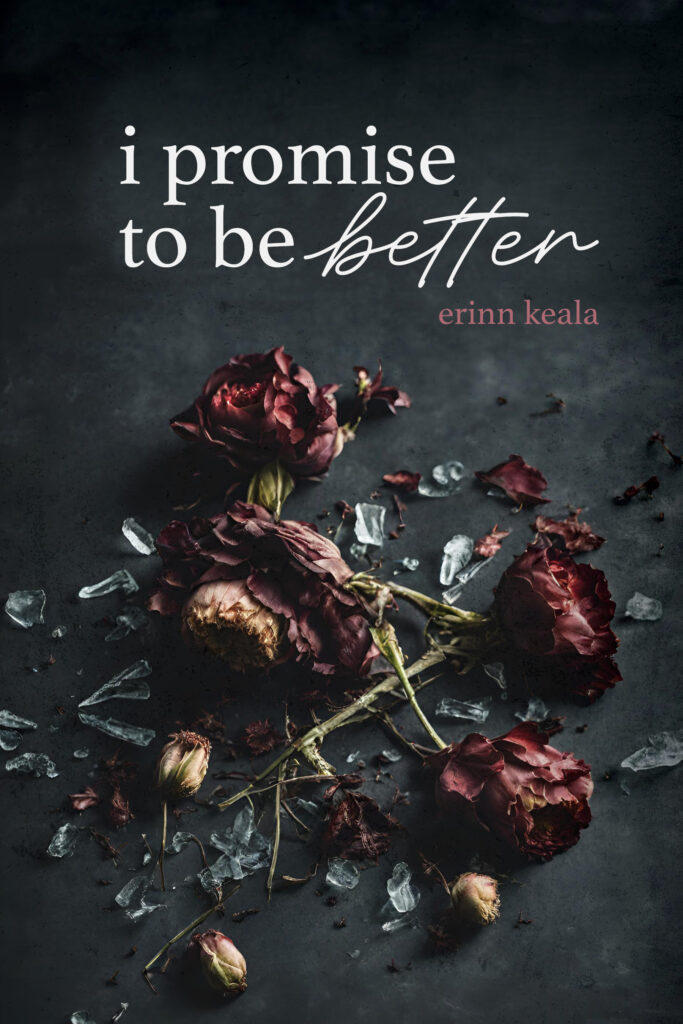Erinn Keala’s journey of healing through writing is a powerful reminder that vulnerability can lead to profound strength. In her book I Promise to Be Better, she transforms the pain of an abusive relationship into a story of resilience and growth. Through raw honesty and emotional depth, Erinn not only confronted her own trauma but also extended a hand to others who may be struggling in silence. Her story is an inspiring testament to the healing power of self-expression, and she hopes to show others that it’s never too late to reclaim your life and your strength.
1. What inspired you to write “I Promise to Be Better”?
This book is based on true events from the toxic relationship which took hold of my life from my teenage years into my early 20s. Several years after that relationship ended, I learned I was struggling with PTSD from burying my trauma instead of addressing it. My therapist encouraged me to journal, and I found writing to be incredibly cathartic. Years of spilling raw and vulnerable emotions into words are what formed the backbone of “I Promise to Be Better”. This book is written from the depths of my worst memories in an effort to bring healing to myself and others.
2. Can you share a bit about the journey from your abusive marriage to finding the strength to write your book?
It took a while to regain my strength. When my marriage ended, I sprung into avoidance mode. I took antidepressants and distracted myself with parties, alcohol and traveling throughout Europe. I eventually ended up in a stable relationship with my now-husband, which further led me to avoiding my past trauma since I did not feel the need to address it in my now-safe environment. But trauma has a way of lingering in the body and will show itself eventually. After years of burying it, and despite being in a happy and healthy marriage, I found my anxiety and depression reaching peak levels. I was struggling with insomnia, vivid nightmares, night sweats, constant anger and irritability, among other health issues. I finally began therapy, which was the catalyst to begin journaling, which evolved into writing my novel.
3. How did writing this book help you in your healing process?
Writing this book helped me process memories I had buried deep. There were many moments I had brushed off as “not that bad,” and writing them on paper gave validity to the impact they had on me. The story, as a whole, is pretty heartbreaking. I was able to look back at the magnitude of what I had experienced and give myself so much grace and understanding. It is difficult to process or even acknowledge trauma in real time — writing this book allowed me to revisit painful memories and really live through them, assigning them thoughts and feelings.
4. What were some of the most challenging parts of writing about your trauma?
Writing this book took me to dark places that brought up feelings of shame, embarrassment and anger. I had to do a lot of self-forgiveness. In hindsight, there are a lot of things I wish my younger self had done differently. It angered me to watch the main character, Emily, ignore red flags and return to her abuser so many times; but, I felt it was imperative to tell my truth and face that shame head-on.
5. How did you cope with PTSD during and after writing the book?
I did a lot of therapy and EMDR before and during the process of writing my book. I’m also supportive of psychedelic microdosing but encourage people to do their own research there.
6. Were there moments when you found it particularly difficult to open up about your experiences? How did you overcome those moments?
Reliving those experiences and wishing I could change them was difficult, but it became a little easier writing them through the lens of a fictional character. I was able to sit in a moment and feel it through Emily’s eyes and emotions, even when unable to remember my own. I didn’t write my manuscript chronologically — I tackled the less difficult events first to warm myself up to eventually tackle the hardest ones. I also took many breaks from writing and didn’t force it upon myself when I wasn’t feeling it. It took me three years to get the story finished.
7. What advice would you give to someone who is struggling to share their own story of trauma?
Go at your own pace, and share only what you feel comfortable sharing. Everyone’s trauma and healing process looks different. Start somewhere that feels safe — whether that’s your journal, your therapist (don’t be afraid to change therapists until one feels right), your friend or family member or significant other — and go one step at a time. But please, don’t keep it bottled inside of you forever. You deserve to be free of that burden, whether you choose to share it with one person or many.

8. How did you find the courage to be so vulnerable in your writing?
I embrace my vulnerability as a strength, not a weakness. I was silently dying on the inside, carrying around this trauma that was never rightfully mine to carry. It got to a point where I had to ask myself, “What do I have to lose by just spilling it all?” I was worried about how certain people would react to my story, but ultimately, I had to allow myself to be selfish. This is my story and my healing journey, and it’s important to do it in a way that feels right to me.
9. In what ways has sharing your story impacted your mental health?
My story has allowed me to be free of the weight of my trauma. My story will always be a part of me, but now it’s Emily’s story, and every other woman’s story who can relate. The burden is no longer mine to carry silently. Publishing the book introduced a level of discomfort and vulnerability unlike any I’ve experienced – and I powered through. That gave me a newfound sense of pride in myself.
10. Can you describe any support systems or resources that were crucial for you during this journey?
Therapy, as mentioned, but also my husband. I was very private about my writing and he respected my privacy. He gave me uninterrupted time to write and process the emotions that came up while writing. He never questioned my decision to put my story out into the world. Writing this novel was a personal process for me. I didn’t use alpha or beta readers like many authors do; instead, I worked in a silo. But knowing I had his silent support throughout the process made all the difference.
11. How has your experience writing this book changed your perspective on healing and recovery?
I used to view myself as strong because I could put on a smile and ignore the world burning down around me. I thought I was strong because I didn’t need to talk about my trauma; I didn’t need therapy; I didn’t need to journal… I could just power through. My perspective has completely changed. I now believe our pain is meant to be shared. I view myself as strong because I’m not afraid to speak openly about my struggles, and I hope that by doing so, I can encourage others to embrace their own vulnerability.
12. What message do you hope readers take away from “I Promise to Be Better”?
I hope readers who were in similar situations find validation in knowing they are not alone, nor at fault. This book may be deeply triggering for those who experienced similar abuse, but I hope it is also empowering to see the main character find her strength. It is never too late to start a better life. Healthy, wonderful, safe love exists, and you are deserving of it.
13. Have you received any feedback from readers that particularly resonated with you?
This book has opened deeply meaningful conversations with other women who endured similar relationships. Someone told me it healed parts of her she didn’t know needed healing. Another told me the story gave her closure in knowing none of what she experienced was her fault. Another told me she was at a loss for words to describe what this book did to her. There is nothing more impactful than knowing that sharing this story has helped others heal – I take that very seriously to heart.
14. What advice do you have for other women who might be struggling with similar experiences?
Know that help is available. Keep the National Domestic Violence Hotline saved in your phone; use it if you need to. Abusive relationships are extremely complicated, confusing and isolating — know that you are not alone, nor at fault. Know that you deserve safety. Know that you deserve better.
15. How do you maintain your mental well-being while continuing to engage with your past trauma through your book?
I truly feel that publishing my story was the biggest part of my healing journey and has helped close a chapter of my life. I know it might seem weird to people that I’m finally speaking about my past trauma 10 years after my marriage ended, but that’s how long it took for me to find my words. Going forward, I don’t plan to keep anything bottled.
IG and TikTok: @erinnkeala






